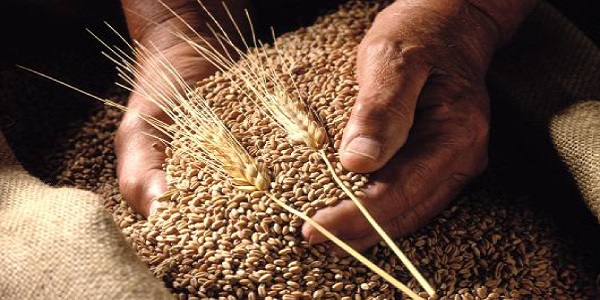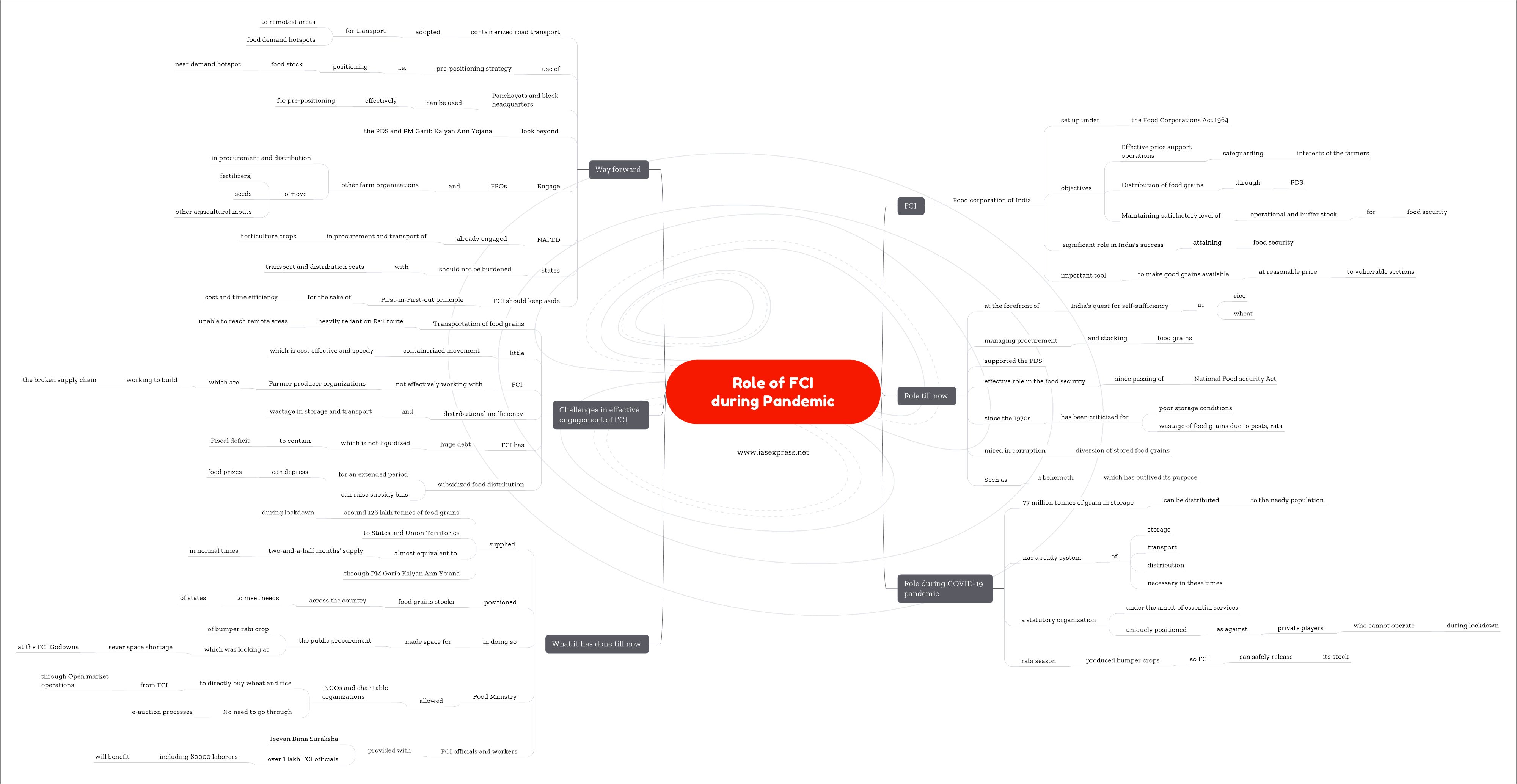Role of Food Corporation of India (FCI) amidst Pandemic – Explained (updated)

The nationwide lockdown since March 25, 2020 can potentially create food shortages and hunger issues for more than 2/3rd of the Indian population which relies on the public distribution system for affordable food. The Food Corporation of India hence becomes an important institution that can provide for this needy population during the lockdown period when all the economic activity is at standstill.
This topic of “Role of Food Corporation of India (FCI) amidst Pandemic – Explained (updated)” is important from the perspective of the UPSC IAS Examination, which falls under General Studies Portion.
What is the Food Corporation of India (FCI)?
- The Food Corporation of India was set up under the Food Corporations Act 1964, to fulfil the following objectives of the Food Policy:
- Effective price support operations for safeguarding the interests of the farmers.
- Distribution of food grains throughout the country for the public distribution system.
- Maintaining satisfactory level of operational and buffer stocks of food grains to ensure National Food Security
- Since its inception, FCI has played a significant role in India’s success in transforming the crisis management oriented food security into a stable security system.
- It is an important tool to make good grains available at a reasonable price, particularly to the vulnerable sections of the society.
What has been the role of FCI till now?
- In its first decade, the FCI was at the forefront of India’s quest for self-sufficiency in rice and wheat following the Green Revolution, managing procurement and stocking grain that supported a vast Public Distribution System (PDS).
- It has had an effective role in the food security of India since the passing of the Food Security Act.
- But since the 1970s it has been criticized for poor storage conditions which led to wastage of food grains due to pests, rats, etc.
- The storage conditions have been in a sorry state as the FCI was facing a serious space shortage after a bumper rabi crop the last season.
- It has also been mired in corruption where the food grains stored have been diverted earning an infamous name of “Food corruption of India”.
- It has been seen as a behemoth that has outlived its purpose.
But due to the corona crisis, it has been hoped that the FCI can be a huge help in negating a potential hunger and starvation condition looming over the country due to lockdown.
What role can the FCI play during the COVID-19 crisis?
- The FCI had about 77 million tonnes of grain in storage which can be distributed to the needy population during these times of pandemic.
- It has a ready system of storage, transport, and distribution which could be effectively used to reach areas of dire needs.
- The FCI is a statutory organization that can be brought under the ambit of essential services. it is uniquely positioned to move grain across the borders while private players are facing problems.
- The rabi season has produced bumper crops yet again. So, FCI can safely release its stored woodgrain without reservations of future shortages.
What has the FCI has done till now?
- The Food Corporation of India (FCI) has supplied around 126 lakh tonnes of food grains, almost equivalent to two-and-a-half months’ supply in normal situations, to States and Union Territories during COVID-19 lockdown.
- The PM Garib Kalyan Ann Yojana has been the reason for the record supply.
- Enough food grains stocks have been positioned across the country to meet the demands of the State governments for feeding the people affected due to COVID-19
- In doing so, far from not having a “proactive liquidation” policy for its stock, it has made space for the public procurement of bumper rabi crop that was looking at the storage shortage and consequent wastage.
- To facilitate cooked food distribution at privately-run relief camps during the COVID-19 crisis, the Food Ministry has allowed NGOs and charitable organizations to directly buy wheat and rice from the Food Corporation of India at Open Market Sale Scheme rates without going through the e-auction process.
- These philanthropic organizations can purchase 1 to 10 metric tonnes at a time at the predetermined reserve prices and lift the grains from FCI’s 2,000-odd godowns across the country
- The FCI is working rain and day out to manage the supply of the food grains. Acknowledging this, It has been decided to provide Jeevan Bima Suraksha (life insurance cover) to over one lakh FCI officials, including 80,000 laborers, working amid the COVID-19 crisis.
What are the challenges in the effective engagement of the FCI in the fight against the corona crisis?
- Though the FCI has a pre-existing system of transportation in place, it is heavily reliant on the rail route. But as the FCI itself knows, rail transport is not suited in times of crises like this when food is to be transported to the remotest areas.
- The containerized movement is the most cost-effective mode of transport but it is not the dominant way of transport of the FCI.
- The farmers are reaching out to the customers directly in desperation. The Farmer producer organizations (FPOs) are trying to build a broken supply chain. The FCI has not been able to have a useful link with these FPOs.
- The ever-present distributional inefficiency and wastage in storage and transport are an issue too.
- The FCI has a huge debt- to the tunes of 2.25 lakh crores in the form of National Small Saving Funds Loan alone. The government has not been liquidating these to contain the fiscal deficit numbers. This may hamper the effective engagement of the FCI.
- The subsidized food distribution for an extended period can depress the food grain prices in the country, which is harmful to the farmers.
- There is a problem with the subsidy bill being huge.
What can be the way forward in this scenario?
- The containerized road transport must be adopted for effective and speedy transport to the needy and remote hotspot areas.
- The tried and tested pre-positioning strategy, where the grain is stored in proximity to the demand hotspots, must be used. The United States has been using it in international food aid programs. The block headquarters and Panchayats can be the storage centers.
- The government should look beyond the PDS and PM Garib Kalyan Ann Yojana to utilize existing networks such as Farmer Producer Organizations and rural self-help groups under NRLM for last-mile distribution in needy areas.
- While distributing the food grains, care should be taken that excess burden doesn’t fall on already burdened states. The already financially burdened states may not be in a position to increase storage capacities, arrange extra manpower for their Targeted PDS. The NRLM SHG cadre, FPOs are ready manpower which can be directly aided by the central government.
- Though the First-in-First-Out (FIFO) principle is a needed principle in general as it allows liquidation of old stocks first, in times of crises like COVID-19, it is advisable to keep it aside temporarily as it allows cost effective and less time-consuming movement of food grains. The need of the hour is to provide food to the people who have returned to native states and have no income source to feed themselves during lockdown. The doing away of the FIFO will help in minimizing operational time and costs. It is especially important when there are critical voices complaining that FCI is not moving fast enough.
- Like NAFED which has already engaged itself in procurement and transport of horticulture crops to support FPOs, the FCI should also look to support FPOs and farmer groups to move a wide range of inputs including fertilizers, seeds and other agricultural inputs.
Conclusion
This pandemic has provided the FCI with an opportunity to reinvent itself as an “agency for innovations in food management system” as recommended by the Shanta Kumar committee. Along with playing an important role in food relief in times of pandemic, it can also shed its image of an outlived entity and become an organization of excellence ushering in a new era of food grain management in post-pandemic India.
Practice Question for Mains
The Food Corporation of India has both a role to play and an opportunity to reinvent itself in this crisis time. Discuss (250 words).



audio speaker is good